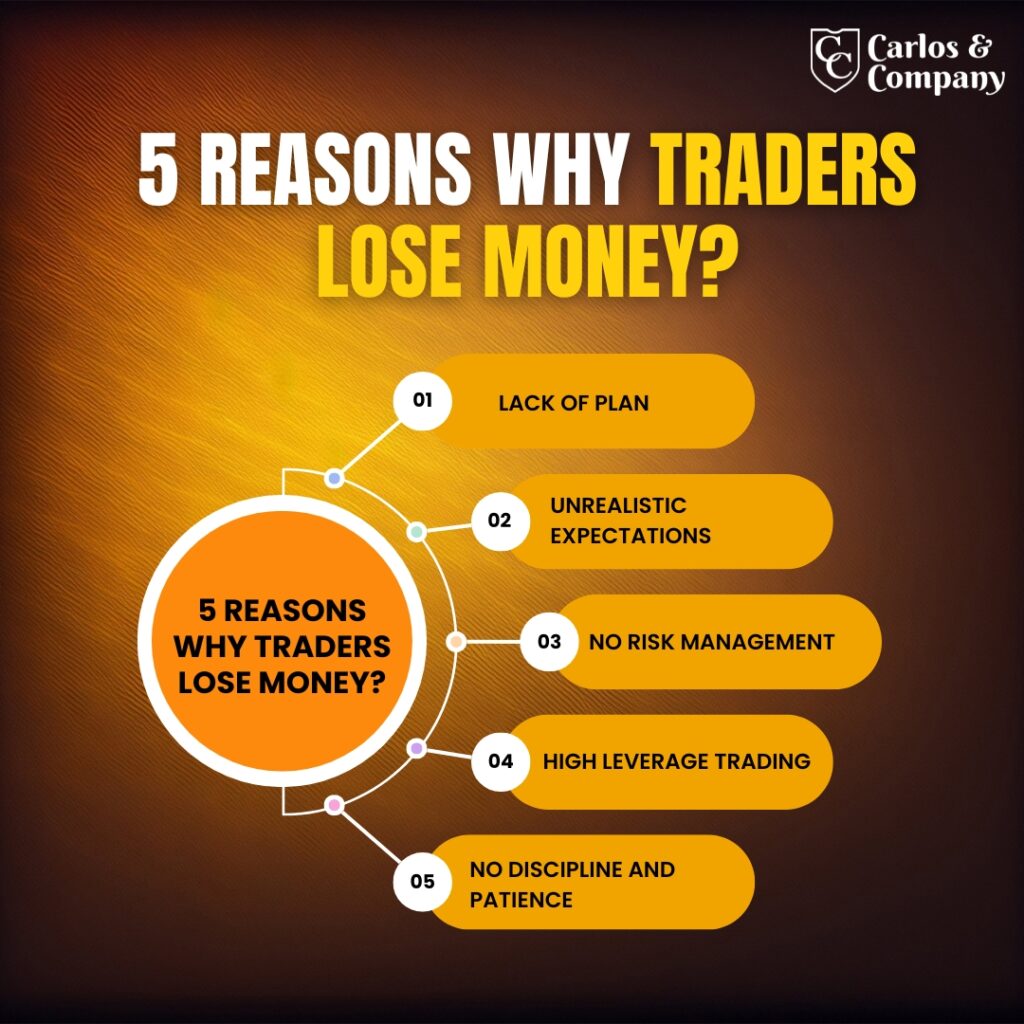Why Most Trading Strategies Fail in The Forex Market
Forex is the largest financial market, with many people entering the market daily. There are around 10 million traders in the world, but when you look at how many traders are successful, the percentage is quite less.
As per data, 90% of forex traders fail in the forex market. Strategy is the key reason for this high failure rate. In Carlos and Company‘s blog, we will discuss the most popular reasons why most strategies fail in forex. So let’s get started.
Wondering why most traders fail in forex?
Well, you are not the only one. The forex market is a place that has witnessed numerous forex trading success stories.
However, even after the 90% failure rate, it scares people from entering the forex market. So let us discuss the major forex problems and solutions:
Here's a quick look at what you'll read
Yes, most traders fail in the financial market. According to reports, 90% of new traders fail in the market.
- Lack of Plan
- Unrealistic Expectations
- No Risk Management
- High Leverage Trading
- No Discipline and Patience
Most traders fail due to lack of discipline, poor risk management, emotional decision-making, and unrealistic expectations of quick profits.
Many strategies fail because they’re not tested properly, don’t adapt to changing market conditions, or traders abandon them too early due to impatience or losses.
The hardest mistake to avoid is letting emotions like fear and greed override your trading plan, leading to impulsive and irrational decisions.
Ignoring Learning
The top reason why most traders fail in the forex is avoiding learning. Forex is a place like an ocean full of waves, and you cannot control these waves.
In order to survive, you need to learn to ride in waves, and the same is true with the forex market. Making an effective strategy is impossible without proper knowledge. So here is what you need to learn before starting trading:

- Master basic forex market terminologies, such as currency pairs, pips, lots, quote currency, base currency, exchange rate, etc.
- Learn technical fundamentals and sentiment analysis with tools and indicators.
- Study risk management, leverage, order types, and trading strategies.
Unrealistic Expectations
Most strategies in the market aim for big profits with respect to their capital. If you think that you invest in forex, and some magic will happen, and your capital gets doubled, then you are in the wrong place.
The reason why most trading strategies are fake is that they lure traders with impossible and unrealistic returns in no time. The profit expectations should be realistic, considering your currency pair, trading time frame, leverage, and risk. Aim for 5 to 15% of profit to keep your expectations realistic.
Lack of Plan
A plan in forex means having clear trading criteria. It means knowing the what, why, when, where, who, and how of trading. Most traders start trading without having a clear idea of their trading time frame, risk appetite, profit expectations, or even the preferred currency pairs.
Randomly using any strategy or risk-to-reward ratio or trading any pair leads to unfavorable results. So, before starting your trading journey, you should know what you will do in the market.
No Rule Trading
Rules are important in life. Even in the trading world, successful traders have some rules, and they stick to them. However, novices do not have such rules; as a result, their strategies lose credibility.
So, frame some rules to protect your capital from excessive losses. The top trading rules include:
- Decide risk and reward per trade and close the trade accordingly.
- Have a clear idea of the Analysis methods and tools you will use.
- Decide the leverage ratio and lot size, and stick to them.

Overtrading
The reason why most traders lose big money in the market is that they place high-frequency trades. Generally, traders come with a mindset that the more trades you place, the more profit you will get.
And in the process, they get addicted to watching charts and trading every possible opportunity. However, the more trades you place, the greater the risk is associated. So, work on trade quality rather than quantity.
High Leverage Trading
Leverage can maximize your gains, attracting most young traders. Undoubtedly, leverage can do so by enhancing your ability to place much bigger trades than your capital.
However, it not only increases the profit amount but also the loss amount. Using high leverage, such as 1:1000 or 1:500, even leads to significant losses, and it increases the chances of the account blowing up. So, traders, especially the new ones, should trade with leverage less than 1:50.
No Risk Management
Risk is the most essential and critical element of trading. How well you manage the trading risk defines how long you will be going to survive in the market. However, most traders only see the positive side of trading, which is profit, and ignore the dark side, which is the probability of losses.
Ignoring losses is not a solution; managing is. So, you need a solid risk management plan to manage the risk associated with trading. It includes trading with a risk-to-reward ratio of 1:3, setting a 1% or 2% risk per trade, and spreading capital to diverse trading assets.
No Discipline, No Patience, No Profit
Discipline and patience are what you need to achieve success in the market. And most trades fail in the market because they don’t have these two things.
Lack of discipline results in overtrading, placing high-risk and leveraged trades. A lack of patience results in impulsive trade decisions and emotional trading. The reason for every trading problem is a lack of discipline and patience. So, work on your trading psychology and embrace discipline and patience in the trading journey.
Lack of Flexibility
Sticking to trading rules and being too rigid to change even when things are not working in favor are two different things. If you suffer continuous losses, your plan and trading rules lack effectiveness.
So, analyze its strengths and weaknesses and make changes accordingly. Also, in the forex world, the market conditions change within seconds. The market changes within the time you decide to place and at the time at which you place trades. So watch on conditions, keep a scope for changes, and adjust your trades accordingly.
Not Maintaining a Trading Journal
A trading journal is what tells you the reality of your journey. Basically, a journal deals with the everyday recording of our trading activities with profits and losses.
Most traders start preparing a journal and then stop. Every day, recording trades requires discipline and consistency. And not every trader has it. But those who journalize their trades have a clear idea of their trading. And this will help them in improving and customizing their strategy to stay consistently profitable.
Wrapping Up: Why Most Traders Lose Money
Most Traders lose money in the market because they don’t have a proper plan, robust risk management process, comprehensive analysis, flexibility, and the right psychology.
Making money is actually quite easy in the forex market, but it requires the right knowledge and mindset. Many traders have made significant money, and you can do so too. You just need a proper approach, embrace the solutions we have discussed above, and see the results.
Also, if you are looking for any kind of assistance or mentorship, Carlos and Company can help you. Our team provides forex trade alerts to traders to assist them in their trading journey. Reach out to try our demo alerts.
